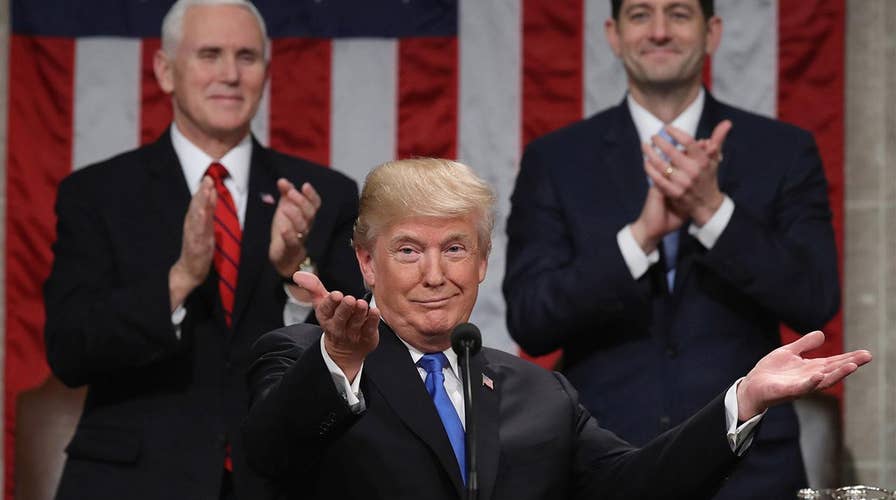Trump’s 2018 State of the Union in four minutes
A look at the major highlights from President Donald Trump’s 2018 State of the Union which addressed the economy, immigration, infrastructure, Guantanamo Bay, North Korea and more.
When President Trump delivered his first State of the Union address Tuesday night, he faced a critical challenge. Despite a year of achievements — including historic tax and regulatory reform, confirmation of conservative judges, elimination of the Islamic State’s physical caliphate, repeal of the unpopular ObamaCare individual mandate, a booming stock market, a growing economy and unemployment near 45-year lows — Trump’s approval rating on the eve of his address was just 38 percent.
A president this successful should not be this unpopular.
Stepping up to the lectern of the House of Representatives on Tuesday night, Trump had an opportunity to change this dynamic and expand his base, by making the case for his presidency to tens of millions of Americans who support many of his policies but don’t yet support him.
He seized that opportunity. Unlike most presidents, who wait till the end of their address to call out heroes in the gallery, Trump began doing so at the outset. It was a brilliant move. He called out Coast Guard Petty Officer Ashlee Leppert, who rescued victims of Hurricane Harvey, and beloved Congressman Steve Scalise (R-La.), who survived an assassination attempt and returned to work just three and a half months later. Starting with these stories was deeply unifying and cut through the cloud of contempt emanating from the Democratic side of the aisle — forcing everyone in the chamber to rise and applaud.
Trump then used these stories to make an appeal to Democrats: “It is not enough to come together only in times of tragedy,” the president said. “Tonight, I call upon all of us to set aside our differences, to seek out common ground and to summon the unity we need to deliver for the people we were elected to serve.” House Minority Leader Nancy Pelosi looked ridiculous as she sat stone-faced, hands folded in her lap, amid the loud applause that filled the chamber.
Trump then appealed to black and Hispanic Americans who did not support his election, noting that “African American unemployment stands at the lowest rate ever recorded, and Hispanic American unemployment has also reached the lowest levels in history.” He declared that “we want every American to know the dignity of a hard day’s work. We want every child to be safe in their home at night” and promised to “lift our citizens from welfare to work, from dependence to independence, and from poverty to prosperity.” He promised to “embark on reforming our prisons to help former inmates who have served their time get a second chance.”
He next extended “an open hand to work with members of both parties, Democrats and Republicans” to “craft a bipartisan approach to immigration reform.” He asked Democrats to join him in producing an infrastructure bill that generates at least $1.5 trillion in new investments. He endorsed popular bipartisan priorities such as workforce development, job training and vocational education, as well as additional funding to fight the opioid epidemic and “Right to Try” legislation to give dying Americans access to lifesaving experimental drugs. He backed Democratic priorities such as paid family leave.
And throughout it all, he continued to weave stories that pulled at the heartstrings of the members in the chamber and the viewers at home: an Albuquerque police officer and his wife who adopted the child of a homeless heroin addict; two families who lost children to MS-13 gang violence; an Air Force veteran who became an Immigration and Customs Enforcement agent and led an operation that took hundreds of gang members off the streets; an Army staff sergeant who won a Bronze Star running into a booby-trapped building in Syria to save a fellow warrior wounded by an improvised explosive device; the family of Otto Warmbier, a college student who died after imprisonment by the North Korean regime; and a courageous defector who traveled thousands of miles on crutches across China and Southeast Asia to escape to freedom.
His speech was moving. It was reasonable. It was bipartisan. And it worked. A CBS News-YouGov instant poll found that 75 percent of viewers approved of Trump’s speech while only 25 percent disapproved. Those who approved included 97 percent of Republicans, 72 percent of independents and even 43 percent of Democrats. Not bad for a president with only 38 percent approval.
In other words, Trump won over a lot of Americans with his State of the Union address — at least for the night. He created an opening. Let’s see what he does with it.









































